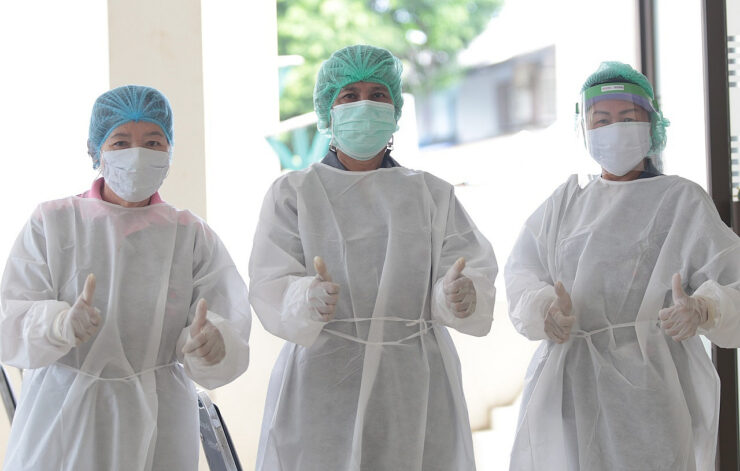Like other pandemics throughout human history, COVID-19 has caused profound changes that are still rippling through our societies, even as people are understandably eager to move on. In fact, these impacts are all the more dangerous when they are largely ignored or effectively invisible. The decline in adult vaccination may be one of the most significant, as a new report finds that ~100 million doses were missed in 2021 and 2022 alone – reversing global progress towards widespread adult immunisation as a new standard of care in a world of more old than young.
These figures should be a call to action for health systems, economies, and societies worldwide. With more than 1.4 billion people over age 60 by 2030, adult vaccination is one of our most important and cost-effective public health measures. It not only protects against serious diseases like influenza, shingles, pneumonia, and now RSV, but also the emergency care, hospitalisations, comorbidities, long-term health consequences, lost productivity and immeasurable quality of life deterioration attached to each disease. These impacts are even more tragic for being entirely preventable, yet rates of adult vaccination remain relatively low and have only gone backwards since the pandemic.
According to the Report, produced in collaboration with GSK, the Global Coalition on Aging, and the IQVIA Institute for Human Data Science, our world was making steady progress before the pandemic to reach a high of 400 million annual adult vaccination doses globally. Then COVID-19 struck, slashing this total to 363 million in 2021 and 351 million in 2022. This means tens of millions of adults who would have been protected are now vulnerable to potentially life-threatening disease with consequences for their caregivers, employers, family members and communities; influenza alone is estimated to cause as many as 5 million hospitalisations and 650,000 deaths each year.
Yet we do not even have sufficient data to fully understand the scope or specifics of the problem. Even basic reporting on vaccination coverage for adults is not commonplace, and we are a long way from gathering the robust, real-time data needed to set benchmarks, track progress, and see what’s working and where more needs to be done.
We know progress is possible – in fact, COVID-19 vaccination itself proves the point, as more than 70 per cent of the world’s population has received a dose. Or consider childhood immunisation, which stands as one of the great public health triumphs of the 20th century, itself leading to our 21st Century Longevity, and a common-sense measure that is now prioritised as a matter of course.
Global health organisations, policymakers, and health system leaders now need to bring this same level of urgency and scale to adult vaccination. We can target four important steps to make adult vaccination a new standard of care, supported by smart policy and strong health system implementation. And then, Life Course Immunisation will become a basic prevention strategy for health systems today, powerfully supporting healthier longevity, health systems sustainability and economic value creation.
First, we need more and more consistent robust data and reporting on adult vaccine uptake. The United Nations, World Health Organization, OECD, and other organisations should prioritise the data-collection infrastructure to track progress, generate insights, direct resources, and enable follow-up. Greater availability of digital data at both the national and regional level can help to ensure people are receiving vaccines on schedule, as well as monitor progress and efficacy overall.
Second, health policy can prioritise adult vaccination as a no-brainer and a best-buy. Adult vaccination programmes should be well-funded and well-designed, with clear vaccine calendars, incentives for providers, and strategies to engage the public. Additionally, policymakers can expand access and convenience by making it easier for providers like pharmacists to provide vaccines as a standard preventive measure available in the community. Let’s also build adult vaccination as a central component of life course immunization that is for all citizens before they become patients.
Third, much like COVID-19 vaccination, all adult vaccination programmes should include a range of advocates and touchpoints. Employers, Age-Friendly Communities, and local organisations from police departments to everyday citizen engagements all stand to benefit from helping keep older adults healthy, active, independent, out of the hospital, and protected from long-term health challenges. All of these channels should take the initiative to build awareness, trust, uptake and greater data understanding, collection and awareness.
Fourth, prepare for health innovation to continue expanding our arsenal of vaccines. We’ve already seen important progress, with the recent approval of an RSV vaccineunderscoring the point. More vaccines are on the way – but these innovations won’t achieve impact unless we have the systems, policies, and funding in place to ensure adults actually use them. An expanding market for adult vaccination will itself underpin, become an incentive for and a stimulus of innovation.
The potential value of adult vaccination has never been greater, yet it appears that uptake is headed in the wrong direction. We need better data, stronger action, and greater focus to bridge that gap, recognising adult vaccination as one of our greatest tools for prevention and healthy ageing. If global leaders join together to act, we can flip this story and make robust, routine adult vaccination one of the most valuable healthcare legacies of our time.
Source: OECD Forum
 Global Coalition On
Global Coalition On 